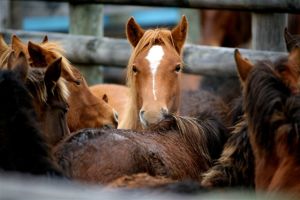Horses Need Your Voice

There is good news for horses! President Obama has signed the budget into law, and it does not allow funds for the inspection of slaughter plants that kill horses for human consumption; therefore, no plants can be opened. That is a great victory; however, it appears that this outcome will not eliminate the continuing operation of plants that slaughter horses for animal food. Nor, does it eliminate the transport of horses to Canada or Mexico to be slaughtered for human consumption. Thus, the issue of horse slaughter itself and transport to slaughter is still front and center in New York State, especially since NYS is a gateway to Canada. We must continue to work to pass NYS bills A3905 and S4615. Not only would the proposed legislation prevent horse slaughter from gaining a foothold in our state, but also, it would prohibit the current practice of transporting horses across the state for the purpose of slaughter in Canada.These bills failed last year. Why? Because they were not allowed out of the Assembly´s and Senate´s Agriculture and Markets Committees. Why? Because it appears that some members of the legislature have been persuaded to believe that any legislation to protect farm animals from cruelty will result in the proverbial “slippery slope.” They believe that slope would lead to all NYS residents becoming vegans, and as a result, the NYS dairy and meat industries would be destroyed. It is difficult to imagine that a bill aimed solely at protecting horses would be perceived as a path to economic ruin for the entire agriculture industry.
Currently, the horses being shipped to Canada through New York come from auction houses in New York and Pennsylvania that sell them to “kill buyers.” These individuals purchase horses and transport them to Canadian slaughter houses that subsequently sell the horse meat to foreign countries. From the time these animals are hauled to auction to the time they are brutally slaughtered, the atrocities they are subjected to are so pervasive and unspeakable that anyone with a modicum of compassion would be completely revolted and sickened.
So, where do these horses that start down this tragic path come from? Based on conversations we have had with those who own small family farms – not from them. These farmers are as opposed to horse slaughter as any animal advocate is. When these small farmers have a horse that needs to be “put down,” they call a veterinarian and have the horse euthanized. Then, they either bury the animal on their property or arrange to have the carcass removed. They care enough to do the right thing by an animal who has served them well.
So where are these horses coming from? They are coming from various sources that treat these animals as though they were inanimate commodities. They come from breeding farms that breed horses continuously to produce a prize-winning thoroughbred — a new champion they hope will win the Triple Crown. The ones who don´t measure-up are disposed of at auction. They are joined there by horses from race tracks across the state. Those horses who fail to win again and again are simply rejected as “losers.” To avoid openly flaunting New York Racing Association´s so-called ban on owners´ sending horses to slaughter, they are clandestinely sold and transported to auctions where kill buyers purchase them. These unfortunate horses also come from various dude ranches and road-side carnivals. At the end of the season, the owners of these businesses callously dispose of the very horses who have provided them with a livelihood during the warm months at the auction. After all, why care for them during the rest of the year when they can always get more horses at auction next spring.
It´s reprehensible and immoral to allow these horses who have done nothing but serve humans, to be sold for slaughter. It is that simple. The honorable thing to do, if these horses are no longer needed, is for owners to act responsibly. First they should make an effort to find the horses homes, and if that is not possible, then have the animals humanely euthanized. Hauling them to auction to make a few dollars by selling them to kill buyers is not an acceptable way to treat these beautiful animals.
We citizens of this state need to make the members of the Agriculture and Markets Committees understand that preventing horse slaughter and transport to slaughter has nothing to do with a slippery-slope. It has everything to do with humaneness. New York should not continue to be a conduit for horse slaughter by proxy.
“The greatness of a nation and its moral progress can be judged by the way in which its animals are treated.” Mahatma Gandhi
By that measure, New York fails in regard to these magnificent animals. Horses helped build this country and have worked side-by-side with our military and law enforcement officers to protect our nation and our communities. They deserve better and we need to ensure that they receive it!
What you can do:
- Write and call your state legislators and the Governor. Let them know you want them to support the anti-horse slaughter bill (A3905 / S4615). Tell them you do not want horse slaughter to ever begin in this state and you want the current horse transport for slaughter stopped. Other states have outlawed both, and New York needs to do so as well. Be a voice for horses, do it now.
- Contact Governor Cuomo at
http://www.governor.ny.gov/contact/GovernorContactForm.php - Find your NYS Assembly member at
http://www.assembly.state.ny.us/mem/ - And your NYS Senator at
http://www.nysenate.gov/.
- Contact Governor Cuomo at
- Make copies of this newsletter article and have it available for distribution at your shelter or business and at events.
- Support NYSHA in its work of lobbying for humane legislation and producing “Investigating Animal Cruelty” workshops.
New York State Humane Association Humane Review, Vol.XXVII, No.2, Fall/Winter 2013-2014.